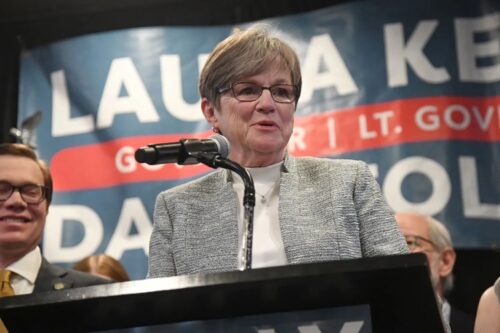
1.16.24 – State Scoop
More than 153,000 people in the state of Kansas are without high-speed internet service due to infrastructure limitations, affordability and other barriers.
ansas Gov. Laura Kelly on Friday announced a new program seeking to improve residents digital skills and maximize the power of the internet as the state continues to deploy new broadband infrastructure.
Through a $4.75 million investment from the state, the Digital Opportunities to Connect Kansans, or DOCK, program complements ongoing efforts to expand broadband connectivity by deploying last-mile and middle-mile infrastructure. More than 153,000 people in Kansas are without high-speed internet service due to infrastructure limitations, affordability and other barriers, according to the governor’s office.
“The Digital Opportunities to Connect Kansans initiative further demonstrates our commitment to ensuring Kansans have the tools necessary to be successful in the digital world,” Kelly said in a release about the DOCK program. “By investing almost $5 million in digital skills training, we are creating a future for every Kansan to harness the power of technology and unlock its full potential.”
Local governments, community organizations and educational institutions are among those eligible to apply for funding through the DOCK program to expand digital literacy skills, according to the Kansas Office of Broadband Development. The maximum individual award is $250,000 with required matching funds of 5%.
The state broadband office scheduled a webinar on Jan. 17 for those interested in learning more about the DOCK program.
“KOBD is committed to ensuring that every Kansan has the access and tools needed for their future success,” broadband office Director Jade Piros de Carvalho said in a release. “Eliminating barriers will continue to level the playing field for all residents of Kansas, fostering innovation and economic growth opportunities.”
Earlier this year, the broadband office debuted a new broadband certification for municipalities in an effort to better prepare them for competitive bids for service and future grant opportunities through federal programs like the Broadband Equity, Access and Deployment program. Volume I of Kansas’ BEAD proposal was among the earliest in the country to be approved by the National Telecommunications and Information Administration.
In November, Kansas also announced a new $14.7 million grant program for organizations addressing challenges of broadband accessibility, affordability and device availability.

Written by Skylar Rispens
Skylar Rispens is a reporter for StateScoop and EdScoop. She previously worked as a reporter specializing in education coverage for daily and weekly newspapers across Montana, where she currently resides.
